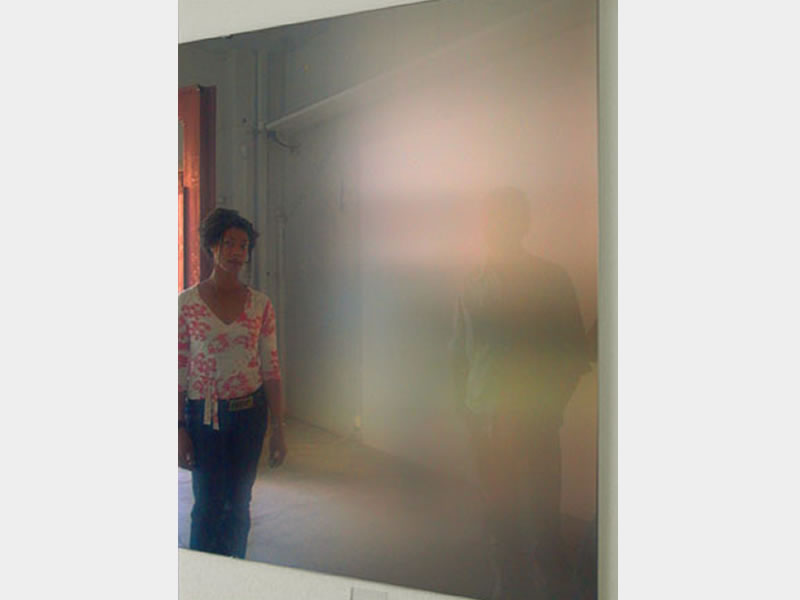selected works
Interactive series of optically deceptive mirrors with sonic feedback
Mirror, optic film, proximity sensors, audio components




One must be receptive to the image at the moment it appears.
G. Bachelard
The Poetics of Space
Driftglass is a striking example of the transformation of everyday objects and behaviors into a new, elegantly intriguing experience. Enacting the image that has disappeared, for the transient body, it is a tease of presence defined through absent reflections and sonic feedback.
In this work, the mirror is subverted as a place of self-reflection and creates a teasing act of disappearance. When approaching the mirror from an angle, a visitor simply notices a mirror, a surface reflecting people and the environment. It is only when viewing the mirror en face (and being caught in the sonic space of the mirror) that they uncannily see themselves as only a vague blur. Side by side, two or more persons will see clear reflections of each other while unable to see themselves clearly. The social environment becomes a substitution for the individual’s own diffused reflection. In this gaze, the other is an imago, an idealized image and projection of desire through which the body is redefined, creating an intriguing social interplay of the gaze. It offers “an exterior destiny to the interior being.” (ibid)
To double the play on presence through sensor technology, a sonic feedback emanates from the mirror itself, a hypnotic ‘ringing’ that intensifies for the lingering body that approaches the mirror in a vain attempt to catch a better glimpse of itself. Referencing the shrill of microphone feedback, it is as if the body were the microphone and the mirror the speaker, and thus the body itself becomes a performer of the work. This sonic repulsion also serves to frustrate the desire to locate an individual identity, while confirming a cultural perception that seeks to refute the individual as separate from the environment itself. In this work, viewer is thus simultaneously affirmed and negated, existing and not existing like a ghost seeking a new shell.




One must be receptive to the image at the moment it appears.
G. Bachelard
The Poetics of Space
Driftglass is a striking example of the transformation of everyday objects and behaviors into a new, elegantly intriguing experience. Enacting the image that has disappeared, for the transient body, it is a tease of presence defined through absent reflections and sonic feedback.
In this work, the mirror is subverted as a place of self-reflection and creates a teasing act of disappearance. When approaching the mirror from an angle, a visitor simply notices a mirror, a surface reflecting people and the environment. It is only when viewing the mirror en face (and being caught in the sonic space of the mirror) that they uncannily see themselves as only a vague blur. Side by side, two or more persons will see clear reflections of each other while unable to see themselves clearly. The social environment becomes a substitution for the individual’s own diffused reflection. In this gaze, the other is an imago, an idealized image and projection of desire through which the body is redefined, creating an intriguing social interplay of the gaze. It offers “an exterior destiny to the interior being.” (ibid)
To double the play on presence through sensor technology, a sonic feedback emanates from the mirror itself, a hypnotic ‘ringing’ that intensifies for the lingering body that approaches the mirror in a vain attempt to catch a better glimpse of itself. Referencing the shrill of microphone feedback, it is as if the body were the microphone and the mirror the speaker, and thus the body itself becomes a performer of the work. This sonic repulsion also serves to frustrate the desire to locate an individual identity, while confirming a cultural perception that seeks to refute the individual as separate from the environment itself. In this work, viewer is thus simultaneously affirmed and negated, existing and not existing like a ghost seeking a new shell.
